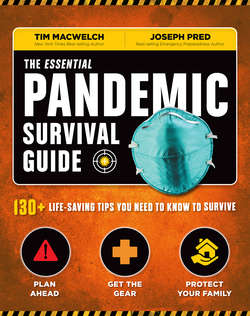Читать книгу The Essential Pandemic Survival Guide - Tim MacWelch - Страница 14
На сайте Литреса книга снята с продажи.
Оглавление0304IF YOU READ NOTHING ELSEWhile the specifics of any outbreak will keep changing and
basics
Coronaviruses cause diseases in humans, mammals, and birds; when one crosses between species, it can go from being be mild in the original species to deadly in others. Often these start as a novel CoronaVirus (nCoV), the term for a medically significant new coronavirus . In humans the viruses cause respiratory tract infections which can range from mild to lethal. It is estimated about 15% of common colds in humans arecaused by coronaviruses. In recent decades, several zoonotic coronaviruses (those that began with an animal strain and crossed over to us) have caused
series outbreaks.
SARS The severe acute respiratory syndrome coronavirus (SARS-CoV) led to the 2002–2004 SARS outbreak. Over 8,000 people from 29 different countries and territories were infected, and at least 774 died worldwide with a fatality rate of 9.2%. SARS is known to have crossed over from to humans either directly from horseshoe bats or by way of wild civet
meat sold at a local market in Guangdong, China.
MERS The first outbreak of Middle East respiratory syndrome-related coronavirus (MERS-CoV), was the 2012 MERS outbreak in the Middle East, followed by the 2015 MERS outbreak in South Korea and the 2018 MERS outbreak centered in Saudi Arabia. MERS has been genetically linked to Camels and Egyptian tomb bats as the zoonotic source of human infection. Globally MERS patients were reported in over 25 countries, with almost 2500 cases worldwide and over
850 deaths reported, giving it a fatality rate of 36%.
COVID-19 The Coronavirus 2 (SARS-CoV-2), the cause of the global COVID-19 pandemic, is a strain of the original SARS virus. The first known patient was infected in Wuhan, the capital of China’s Hubei province, in November 2019. The virus subsequently spread to all provinces of China and to more than 150 other countries worldwide. Most people with COVID-19 recovered. For those who do not, the time from development of symptoms to death has been between 6 and 41 days, with an average 14 days. From a global perspective, the infection fatality rate is estimated to be up to 0.4%. However, of those who are admitted the hospital, the fatality rate is much higher, with a death to case ratio of approximately
6.2% at the time of writing.
FOCUS ON CORONAVIRUS
evolving as the virus does, there are some basic practices that
are almost always appropriate.
£WASH YOUR HANDS If you’re feel like you’re washing your hands too often and for too long, you’re probably
doing it just enough.
£USE HAND SANITIZER If you can’t wash your hands with
soap and water, then this is the next best thing.
£WEAR A MASK A cloth or dust mask works fine to protect
others from droplet transmission.
£COVER YOUR MOUTH Cough or sneeze into the crook of
your arm if you don’t have a tissue.
£DON’T TOUCH YOUR FACE Wearing a face mask helps keep your hands off your nose and mouth, but remember to not touch your eyes either, as an infection get into
your system that way as well.
£WEAR SAFETY GLASSES To protect your eyes from
airborne pathogens and keep you from touching your eyes.
£KEEP AWAY Consider 6 feet (2 m) as a minimum standard to avoid aerosol transmission from people nearby, even if
they have no symptoms.
£
STAY HOME Feeling sick? Stay home to avoid infecting
others and seek medical attention if you feel worse.
£PROTECT OTHERS If someone in your household is sick,
assume you also are contagious.
£SHELTER IN PLACE Remaining at home is the safest way
to avoid exposure.
£WIPE IT DOWN
Disinfect doorknobs,
alarm keypads, or frequently touched surfaces, especially anything else you
touch when first entering your home.
£RINSE OFF
If you must go anywhere,
change clothes and shower as soon as
you get home.
£PRACTICE SELF CARE
Eating well,
sleeping well, and exercising regularly
can bolster your immune system.
